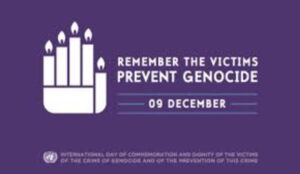 Md Jubair: Every year on 9 December, the United Nations marks the adoption of the Genocide Convention, which is also the International Day of Commemoration and Dignity of the Victims of the Crime of Genocide and of the Prevention of this Crime.
Md Jubair: Every year on 9 December, the United Nations marks the adoption of the Genocide Convention, which is also the International Day of Commemoration and Dignity of the Victims of the Crime of Genocide and of the Prevention of this Crime.
The stateless Rohingya Muslims living in sprawling camps in Bangladesh’s southern border district of Cox’s Bazar More than 1.2 million Rohingya, the majority of whom fled a brutal military crackdown in Myanmar on Aug. 25, 2017, have marked the day by staging rallies to raise awareness of their plight and remind the international community of pledges for their safe repatriation to Rakhine State.
Rohingya held rallies in 12 of the 34 camps to commemorate “Genocide Remembrance Day,” according to local sources told.
At the rallies, stateless people’s community leaders urged world leaders to take all necessary steps at the earliest to ensure the peaceful and dignified repatriation of the Rohingya.
During the rallies, they presented seven demands to the international community, including justice for Rohingya genocide victims, restoration of citizenship rights, repeal of Myanmar’s controversial 1982 Citizenship Law that has been used to deny Rohingya citizenship in their home country, repatriation, compensation for property destruction, and safety guarantee under UN supervision after repatriation.
Many human rights groups have flagged India’s apathy toward Rohingya refugees who have fled Myanmar to escape the violent military crackdown.
An estimated 40,000 Rohingya are in India, at least 20,000 of whom are registered with UNHCR.
Similarly, since from 2016, ultranationalist Hindu groups have targeted Rohingya refugees in India as part of growing attacks on Muslims in India and called for their expulsion from the country. Since October 2018, the Indian government has deported 12 Rohingya to Myanmar, claiming that they left voluntarily.
UN special envoy to increase support
UN Secretary-General’s Special Envoy has called on global leaders to increase support for Rohingya refugees and host communities, according to local media citing a statement issued by the UN office in Dhaka.
“As the Secretary-General reiterated on this solemn occasion, following the military takeover in February 2021, the humanitarian, human rights and security situation in Myanmar have deteriorated. It is critical that the international community continue to seek comprehensive, durable and inclusive solutions to the crisis. We cannot let this become a forgotten crisis,” she said in the statement.
She added: “I will continue to advocate for greater leadership of countries in the region in supporting Bangladesh and leveraging their influence with Myanmar to create conducive conditions for the voluntary, safe and dignified return of refugees.”
The special envoy also emphasized that it is ultimately Myanmar’s responsibility to create favorable conditions for their safe repatriation.
She emphasized the use of education and vocational training as tools to prepare Rohingya for their return to Myanmar.
Meanwhile, the Burma Human Rights Network stated in a separate press release that nearly 600,000 Rohingya remain trapped in Myanmar under discriminatory laws and policies that amount to crimes against humanity and ongoing genocide in the Rakhine state.
“The world must act decisively if they want to end the suffering of the Rohingya and the rest of Burma’s people,” said the rights watchdog’s Executive Director Kyaw Win.





